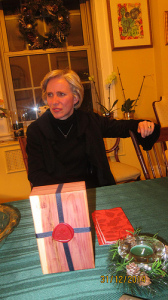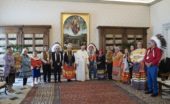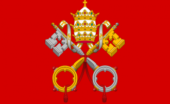Re Ian Bremmer 'Could third-party candidates upend the 2024 US election?' 3 April The current political movement in the USA…
Wednesday Night #1713
Written by Diana Thebaud Nicholson // December 31, 2014 // Reports, Wednesday Nights // Comments Off on Wednesday Night #1713
 What an amazing start to the New Year! A surprise visit from the always gorgeous and intrepid Isabelle Ramsay-Brackstone bearing an unbelievable gift – a bottle of the limited edition Mary Celestia perfume developed by her Bermuda Perfumery – the packaging is so wonderful, Diana hasn’t even opened it to view – let alone open – the bottle. So thrilled!
What an amazing start to the New Year! A surprise visit from the always gorgeous and intrepid Isabelle Ramsay-Brackstone bearing an unbelievable gift – a bottle of the limited edition Mary Celestia perfume developed by her Bermuda Perfumery – the packaging is so wonderful, Diana hasn’t even opened it to view – let alone open – the bottle. So thrilled!
Isabelle, who is the widow of Diana’s godson, Kirby Brackstone (who she met through Wednesday Night), is the owner of the Bermuda Perfumery.
As the intimate group (it was after all New Year’s Eve) munched on Catherine Gillbert’s legendary mince pies and Katherine Waters’ delicious Swedish meatballs, Isabelle regaled us with the story of how she had acquired the then almost 80-year old Perfumery in 2004, studied to become a Perfumer and applied her unique blend of superb taste and a business background – she was one of Guy Stanley and Stephen Blank’s star students at HEC – to reviving the somewhat neglected business while respecting its heritage.
Her latest venture – and adventure – has been the recreation of the perfume found aboard the 1864 wreck of a Civil War blockade runner, the Mary Celestia. The Globe & Mail article Sunken treasure: Civil War-era perfume resurrected for modern senses gives a succinct version of Isabelle’s account of this exciting and demanding exercise. Mention of ambergris and civet as elements in the original perfume that are not included in the 2014 version provoked a spirited debate about the origins of ambergris.
P R O L O G U E
 On New Year’s Eve our icon is Janus, the god of beginnings and transitions, and thereby of gates, doors, doorways, passages and endings. See also Year-end musings and predictions for 2015
On New Year’s Eve our icon is Janus, the god of beginnings and transitions, and thereby of gates, doors, doorways, passages and endings. See also Year-end musings and predictions for 2015
As we look back on 2014, it was not such a great year. At a personal level, we lost some dear friends including one precious family member and are saddened by the grave illness of several others. Turmoil in the world increased rather than decreased, with the rise of ISIS/ISIL and its horrific war on broadly defined infidels, the persistent pugnacity of Vladimir Putin and the consequences felt from Ukraine throughout Europe and far beyond , the erratic behaviour of Turkish President Erdogan. And, there is the dangerous buffoon, Our Dear Leader Kim Jong-un.
One of the few rays of light is Pope Francis who continues to attract the admiration of many Catholics (absent the Curia) and non-Catholics alike. Having stated that he believed that our animal friends had access to the same after-life as humans (at least the good humans), it was then revealed that he had an important role in helping to bring about the end of the U.S. boycott of Cuba. He has scolded the Curia, accusing them of “spiritual Alzheimer’s”, and now he is about to confront climate change deniers. Totally amazing!
We also take great pleasure in the re-energized President Obama who has emerged since the mid-terms. As Mark Shields said last Friday: “In a strange way, he’s been liberated … sadly by the defeat of those four Democrats … But he seems reenergized. I mean, the audacity of hope, hope may not be dominant, but certainly audacity is back in the litany of the things that … he’s done” [immigration reform initiative, climate change, environmental agreement with the Chinese, and the announcement about normalizing relations with Cuba].
Consumers are happy with the sudden decline in oil prices, but it is creating havoc and misery in the economies of oil-rich countries like Venezuela ( Oil Prices Push Venezuela To Brink Of Economic Collapse), and Nigeria (Nigeria’s ailing economy feels effects of terror and oil prices). Canada too will feel the consequences. As pointed out in The Harbinger (a new discovery for us), Analysis: Falling Oil Prices and the Future of Pipelines, falling oil will alter [the] economy. The post points to a 2013 Economist article that suggests that this is not going to be just a blip but more of a sea change, as global oil demand plunges permanently “Yesterday’s fuel — The world’s thirst for oil could be nearing a peak. That is bad news for producers, excellent for everyone else. And in October, the Globe & Mail’s Jeff Rubin wrote:
For pipeline companies with major proposals on the table, such as TransCanada and Enbridge, falling oil prices are a game-changer of the same magnitude that rising prices were a decade ago. Back then, soaring prices created an urgent need to build new pipelines to connect North America’s burgeoning supply to coastal refineries and world markets.
We’re now in a different world. At the root of today’s problem is global demand that is no longer growing quickly enough to support the prices necessary to keep expanding expensive unconventional sources of supply such as the oil sands. Lower prices will effectively strand those reserves regardless of the transportation options that may become available. Even if President Obama approved Keystone XL or the National Energy Board gave the green light to Energy East, falling commodity prices mean that soon there might not be enough oil flowing out of northern Alberta to fill those new pipelines. Plunging oil prices a game-changer for major pipeline projects
Sunday’s crash of the Air Asia flight rounds out a truly terrible year for Malaysia-affiliated airlines and is a sad reminder of the March disappearance of Flight MH370 which, it seems, will remain a perpetual mystery.
In contrast, we offer this up-beat airport story.
Planting Prairies at Airports Could Make Flying Safer
Those landing at Dayton International Airport next year will descend from the spacious skies into the fruited plains. Thanks to aviation director Terrence Slaybaugh’s groundbreaking prairie grass program, they’ll be greeted by songbirds, wildflowers, and shoulder-high grass instead of the typical turf.
Dayton International isn’t doing it for the views. In an effort to make the airport greener, less expensive to maintain, and safer from bird strikes, the airport is turning nearly 300 acres of airport land into native prairie grasses. If a three-year trial proves environmentally and economically effective, 800 more acres may follow.
Important Trivia
Dom Pérignon did not invent champagne
“Dom Pérignon was justly famous for his superb skills as a blender — but his legendary wines did not have bubbles. This is one of the great ironies — we might even say great deceptions of wine history, for conventional wisdom tells us that Dom Pérignon was the delighted inventor of champagne. He is supposed to have quipped to one of his sandal-shod brothers, ‘Come quickly! I am drinking the stars!’ Yet it only made sense that Dom Pérignon wanted to rid champagne of its bubbles. There was no market for sparkling wines yet. In France, nobody wanted them. So, over the course of the next decade, Dom Pérignon dedicated himself to experimenting with ways to stop the development of bubbles.”



